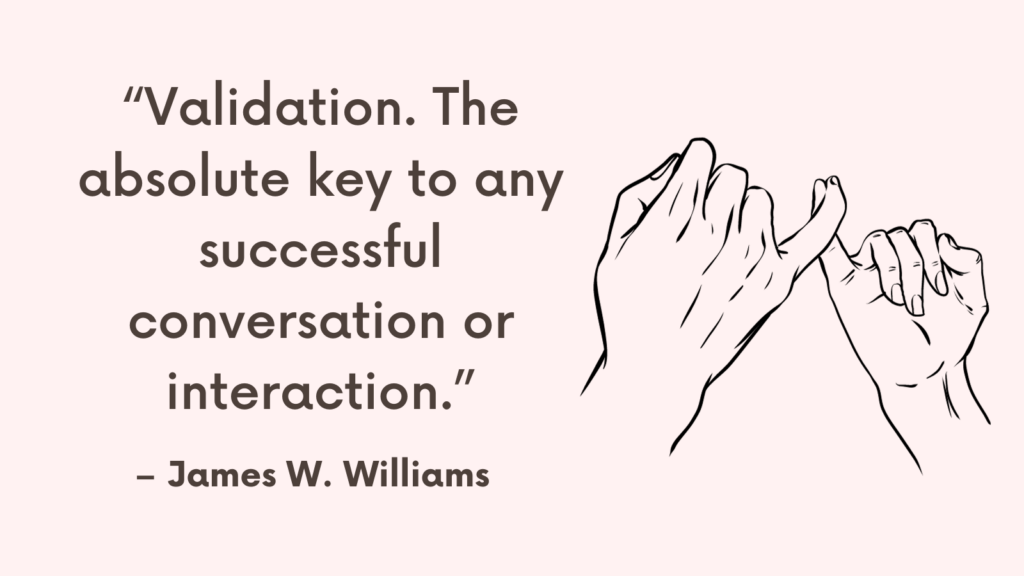This post includes top signs you’re dating a people pleaser.
What Is People-Pleasing?
People-pleasing is a behavioral pattern characterized by a strong desire to gain approval, avoid conflict, and prioritize the needs and preferences of others over one’s own.
Individuals who display people-pleasing tendencies often go to great lengths to accommodate others, even at the expense of their own well-being and personal boundaries.
This behavioral pattern may stem from various underlying factors, such as a fear of rejection, low self-esteem, a need for external validation, or past experiences that have reinforced the belief that one’s worth is tied to meeting the expectations of others.
While the intention behind people-pleasing behavior is often rooted in a genuine desire to be helpful and kind, it can lead to feelings of resentment, burnout, and a lack of authenticity in interpersonal relationships.
Related: People Pleaser Quiz (+Top 21 Proven Ways to Stop People Pleasing)
10 Signs You’re Dating A People Pleaser
Here are 10 signs that may indicate you’re dating a people pleaser:
1. Difficulty Saying No
A people pleaser often struggles to set boundaries and assert their own needs and desires in the relationship.
They may agree to things they are not comfortable with in order to avoid conflict or to gain approval from their partner.
2. Constant Apologizing
People pleasers tend to apologize excessively, even when they have done nothing wrong.
This behavior stems from a fear of disappointing or upsetting their partner and a strong desire to maintain harmony in the relationship.
3. Seeking Validation
Individuals who are people pleasers often seek external validation and approval from their partners.
They may prioritize their partner’s happiness over their own and rely on their partner’s positive feedback to feel good about themselves.
4. Avoiding Conflict
A people pleaser may go to great lengths to avoid confrontation or disagreement in the relationship, sometimes at the expense of their own needs.
They may suppress their own feelings and opinions to maintain a sense of peace and harmony.
Related: Top 7 Signs People Pleasing Is a Trauma Response
5. Neglecting Personal Needs
People pleasers often prioritize their partner’s needs and desires over their own, sometimes to the point of neglecting their own self-care and well-being.
They may struggle to advocate for themselves and communicate their own wants and needs.
6. Fear of Rejection
People pleasers may have an intense fear of rejection or abandonment in their relationships, leading them to prioritize their partner’s happiness to secure love and acceptance.
This fear may drive them to avoid asserting themselves or expressing their true feelings.
7. Overcommitting
It’s common for people pleasers to take on more responsibilities and obligations than they can handle in an effort to meet their partner’s expectations or to avoid disappointing them.
This can lead to feelings of overwhelm and burnout in the relationship.
Related: Fear of Disappointing Others: Top 10 Ways to Overcome it
8. Difficulty Making Decisions
Individuals who are people pleasers may struggle with making decisions, particularly when it comes to their own preferences and desires.
They may defer to their partner’s choices in order to avoid conflicts or to please their partner, even if it means sacrificing their own autonomy.
9. Low Self-Worth
People pleasers may have underlying feelings of low self-worth and may believe that their value is contingent on meeting their partner’s needs and expectations.
They may derive their sense of self-esteem from pleasing others, rather than from a strong internal sense of worth.
10. Lack of Authenticity
A people pleaser may struggle to express their authentic self in the relationship, as they prioritize conforming to their partner’s expectations and desires.
This can lead to a lack of genuine emotional intimacy and connection in the relationship.
Related: Top 19 Journal Prompts For Boundaries
How Dating A People Pleaser Affects The Relationship?
Dating a people pleaser can impact the relationship in various ways:
1. Imbalance in Needs
When one partner in a relationship consistently prioritizes the needs and desires of the other over their own, it creates an imbalance that can lead to resentment, frustration, or guilt.
The people pleaser may neglect their own needs, while their partner may feel burdened by the responsibility of always having their desires catered to.
2. Communication Challenges
People pleasers may struggle to assert their preferences, set boundaries, or communicate openly about their feelings.
This can lead to miscommunication, unmet needs, and a lack of clarity regarding each partner’s wants and expectations.
3. Lack of Authenticity
In relationships with people pleasers, there may be a lack of authentic expression and genuine emotional intimacy.
The pleaser’s tendency to conform to their partner’s wishes or to avoid conflict may hinder the development of true connection and vulnerability.
4. Resentment and Burnout
Over time, the strain of consistently prioritizing a partner’s needs over their own can lead to feelings of resentment, exhaustion, or emotional burnout for the people pleaser.
The other partner may also experience guilt or discomfort knowing that their needs consistently take precedence.
5. Difficulty Resolving Conflict
People pleasers may avoid conflict at all costs, leading to unresolved issues and unaddressed tensions within the relationship.
This can create a cycle of avoidance and suppressed emotions, inhibiting the healthy resolution of disagreements and misunderstandings.
How To Address People Pleasing With Your Partner?
Here are some strategies for initiating a conversation with your partner about their people-pleasing behavior:
1. Choose the Right Time and Place
Select a time when you and your partner can engage in an open and uninterrupted conversation.
It’s essential to create a safe and comfortable environment for discussing sensitive topics.
Related: How to Respond When Someone Is Being Vulnerable?
2. Express Empathy and Understanding
Approach the conversation with empathy and understanding.
Acknowledge that addressing people-pleasing behaviors is a complex and sensitive issue, and emphasize your commitment to supporting your partner.
3. Share Observations and Examples
Communicate specific instances where you’ve noticed your partner prioritizing your needs over their own.
This can help them recognize the pattern of people-pleasing behavior and its impact on the relationship.
4. Validate Their Feelings
Validate your partner’s emotions and experiences, emphasizing that you value their happiness and well-being.
Reassure them that their needs and desires are important to you and that you want to cultivate a more balanced and mutually fulfilling partnership.
Related: How To Validate Someone’s Feelings Without Agreeing? (+Examples of Validating Statements)
5. Explore the Root Causes
In a supportive and non-judgmental manner, explore the underlying factors contributing to your partner’s people-pleasing tendencies.
This may involve discussing past experiences, fears of rejection, or a desire for approval.
6. Collaborate on Setting Boundaries
Work together to establish healthy boundaries and assertive communication strategies that honor both your partner’s needs and your own.
Encourage mutual respect for each other’s autonomy and priorities.
7. Seek Professional Support if Needed
If the dynamics of people-pleasing behavior are deeply ingrained or creating significant distress for either partner, consider seeking guidance from a couples therapist or a mental health professional.
Professional support can provide valuable insights and tools for addressing these patterns effectively.

Conclusion
It’s important to approach this conversation with patience, empathy, and a genuine desire to strengthen the emotional well-being and authenticity within the relationship.
Recognize that addressing people-pleasing behavior is a process that requires sensitivity, understanding, and ongoing support.



